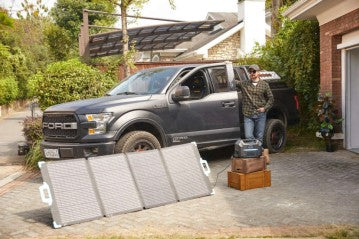
As the popularity of solar energy grows, more and more people are turning to portable power solutions for their recreational vehicles (RVs). One crucial component in any solar power setup is an inverter, which converts DC (direct current) power from your solar panels or battery into AC (alternating current) power that can be used to operate various appliances and electronics. When it comes to choosing an inverter for your RV, one question that often arises is whether you need a pure sine wave inverter or if a modified sine wave inverter will suffice. In this article, we will explore the reasons why you may need a pure sine wave inverter and discuss the implications of using a modified sine wave inverter for your portable RV power needs.
1. Why Do I Need a Pure Sine Wave?
A pure sine wave inverter produces power that is nearly identical to the clean and smooth power provided by the electrical grid. This means that it can safely and efficiently operate a wide range of devices, including sensitive electronics. Many modern appliances and gadgets, such as laptops, smartphones, TVs, and kitchen appliances, are designed to work with pure sine wave power. Using a pure sine wave inverter ensures that these devices will operate optimally and without any potential damage caused by incompatible power sources.
2. Will Modified Sine Wave Damage Electronics?
While modified sine wave inverters are more affordable and widely available, they produce a power waveform that is not as smooth as the one generated by a pure sine wave inverter. The modified sine wave consists of a series of steps rather than a smooth curve, which can lead to compatibility issues with certain devices.
2.1 What Can I Use a Modified Sine Wave Inverter For?
Modified sine wave inverters are suitable for powering basic electronics and appliances that don't have sensitive components. Devices such as incandescent light bulbs, simple fans, and resistive heaters can typically operate without any issues when powered by a modified sine wave inverter. These inverters are also useful for charging batteries, running power tools, or operating older equipment that is less sensitive to the quality of the power waveform.
3. Does a Fridge Need a Pure Sine Wave Inverter?

Refrigerators and other appliances with motors, compressors, or electronic controls are more sensitive to the quality of the power they receive. While some fridges may work with a modified sine wave inverter, it is generally recommended to use a pure sine wave inverter to power these appliances. A pure sine wave inverter ensures stable and consistent power supply, reducing the risk of damaging the appliance or affecting its performance.
3.1 Will a Modified Sine Wave Inverter Run a Microwave?
Microwaves are another appliance that typically requires a pure sine wave inverter. Microwaves use a combination of heating elements, motors, and electronic controls, which are sensitive to the power quality. Running a microwave on a modified sine wave inverter can lead to reduced efficiency, increased cooking times, or even potential damage to the appliance.
4. Can You Convert Modified Sine Wave to Pure Sine Wave?
If you have already invested in a modified sine wave inverter or are considering one for cost or availability reasons, you may wonder if there's a way to convert its output to a pure sine wave. While there are devices called "sine wave inverters" that claim to convert the modified waveform to a pure sine wave, their effectiveness and reliability vary. It is important to note that the conversion process itself can introduce additional complexity and potential issues, and it may be more practical and cost-effective to invest in a dedicated pure sine wave inverter from the outset.
Conclusion
When it comes to portable RV power, choosing the right inverter is crucial for the optimal operation of your appliances and electronics. While modified sine wave inverters may be suitable for basic devices and certain applications, a pure sine wave inverter offers the versatility and compatibility needed to power a wider range of sensitive electronics. Appliances like refrigerators and microwaves, which rely on motors and electronic controls, often require the clean and stable power provided by a pure sine wave inverter. Ultimately, investing in a pure sine wave inverter ensures the efficient and safe operation of your RV's electrical system, providing you with the peace of mind to enjoy your adventures on the road.

0 Kommentare